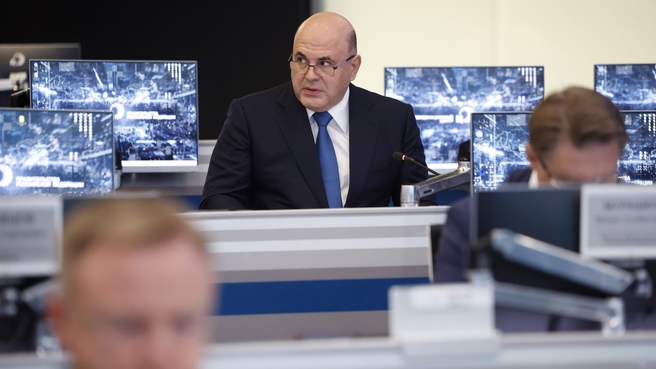Mikhail Mishustin: “We have to accomplish an objective, set by the President, and strengthen technological sovereignty and make sure that the processing sectors develop faster than planned. It is important to continue creating a solid scientific and technological base and training skilled personnel for our production facilities. Actually, the entire vocational training system should aim to accomplish this objective.”
Mikhail Mishustin’s opening remarks:
Good afternoon, colleagues.
Today, we will discuss the vocational training system in great detail at the strategic session. This is a highly important issue for us now that Russian enterprises are taking up the vacant niches left after the exit of foreign companies from the national market. Russian enterprises are expanding production, and many of them have started manufacturing their own goods, and they continue to organise this production process.
We have to accomplish an objective, set by the President, and strengthen technological sovereignty and make sure that the processing sectors develop faster than planned. To accomplish this objective and to ensure our economy’s structural adaptation, we have outlined projects in 13 high-priority spheres, including the aerospace industry, the medical industry, the chemical industry, the machine-tools and instrument engineering industry, the railway and farming machinery sectors, radio-electronics and the power industry, as well as the development of unmanned aerial vehicles (UAVs) and drones.
It is important to continue creating a solid scientific and technological base and training skilled personnel, scientists and experts for our production facilities. Actually, the entire vocational training system should aim to accomplish this objective. During my working trips to Russian regions, I speak with corporate managers and staff members all the time, and the human resources issue remains topical everywhere.
Demand for human resources is highest in our machine-building and chemical sectors, the construction industry and the transport sector. In the next few years, this will extend to the science, healthcare and the IT sectors.
Consequently, we have to overhaul the education system, so that university and college graduates will enter the labour market with substantial competences, enabling them to fulfil the required functions and to remain in high demand and, of course, competitive.
The foundation that has been created is a good one.
The senior forms have been specialised in the most up-to-date sectors since the last academic year.
The approaches towards training vocational school students have been thoroughly revised.
We have launched the Professionalitet federal project. It is very promising and is picking up momentum fast. Currently, the project is being implemented in the majority of Russia’s regions. I would like to note business’s attitude towards this project: they see it as a good opportunity to provide their companies with specialists. Organisations have joined the process in a proactive way, investing about 3.5 billion roubles into developing curricula and upgrading materials and technical infrastructure.
Today, this project involves 900 vocational schools, a quarter of the total. By the end of 2024, they will release 150,000 skilled specialists who are ready to take jobs. From year to year, we will have to increase the rates of personnel training, bringing into the process an increasing number of educational institutions and, of course, companies and partner businesses. This is all the more relevant now that the President has instructed us to train no less than a million specialists within the next five years, before 2028.
We are also implementing this programme at the leading universities with the participation of major industrial companies. Today, we have 30 advanced engineering schools in priority sectors, with another 10 to begin soon. The goal is also to provide high-technology and science-intensive sectors, such as microelectronics, tool-making, AI, nuclear energy, etc., with skilled professionals to carry out high-quality and innovative research for new products.
Colleagues.
Today, considering the trends in technological and industrial development, it is important to understand how many specialists of this kind will be needed in the economy. The President has paid special attention to this. Recently, this was discussed by the Presidium of the State Council. The President has instructed us, jointly with business, to make a five-year forecast of personnel needs every year, keeping in mind the peculiarities of regions, sectors, and professions. These will be employees, who can continue the high-quality implementation of our national projects and other important programmes.
To do this, we will have to change our approaches towards defining the target figures for vocational school and university enrollment based on company needs.
The President stressed that we should more actively motivate higher and secondary professional educational institutions to find good jobs for their graduates. So, we need to establish specialised key efficiency indicators and put out relevant rankings for our schools.
Another point is that many companies need competent workers right now, so it is necessary to create a flexible professional retraining system for existing employees to acquire additional skills and greater employment opportunities.
I want to say that I have met young people on several occasions who hold industrial jobs or are employed in the technical sectors. They tell me about the retraining system. They went through retraining, and it led them to important new positions. Many changed their professions altogether. This system works. I see this during our travels in Russia.
Today, we will discuss all the above with consideration for demographic trends. We will work out balanced solutions for the coming years.













